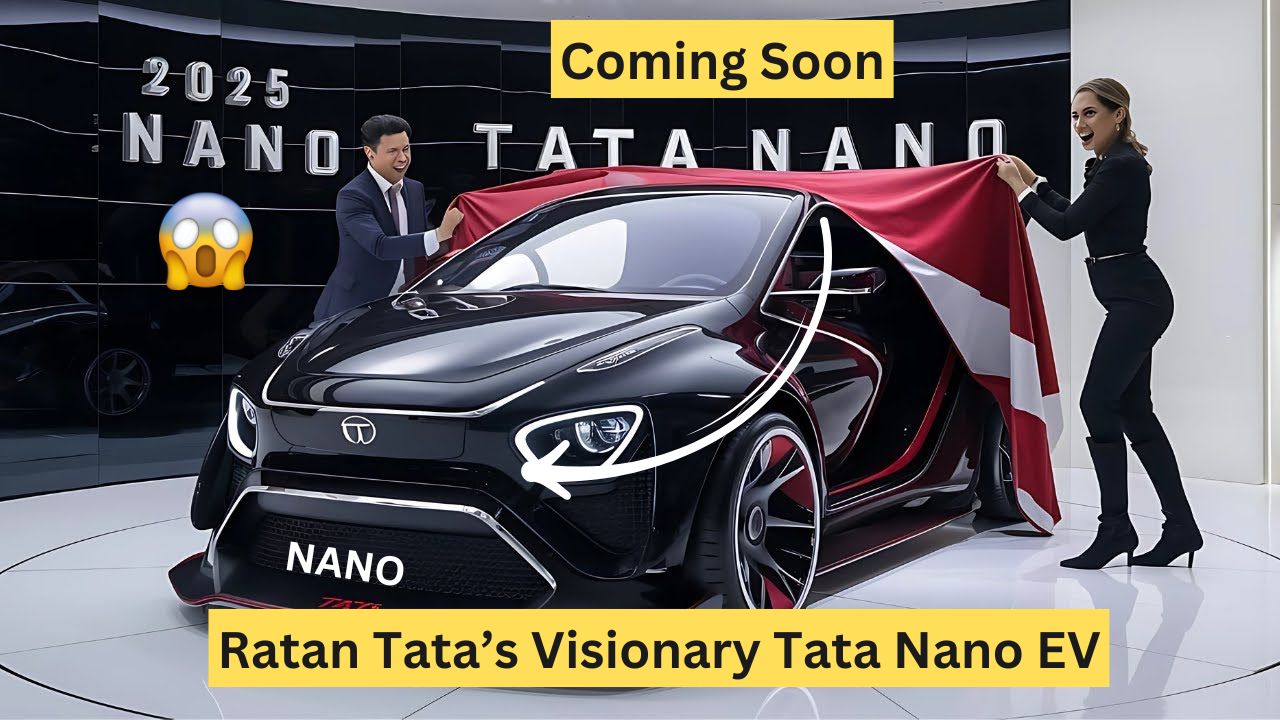Ratan TATAs Visionary Tata Nano EV: In a move set to revolutionize the electric vehicle (EV) market, Tata Motors is reportedly reviving its iconic Tata Nano this time as an electric vehicle! If the buzz is to be believed, the new Tata Nano EV is more than just a car; it’s a dream reimagined.
Ratan TATAs Visionary Tata Nano EV
This anticipated launch could change how India perceives electric mobility, bringing luxury and eco-conscious driving within reach for millions.
A Game-Changer in the Making
First introduced in 2009, the original Tata Nano was a symbol of innovation and aspiration. Dubbed “the world’s cheapest car,” it aimed to provide affordable mobility for Indian families. While the petrol-powered Nano faced its challenges, its legacy as an accessible and visionary vehicle never faded.
Now, Tata Motors, under the visionary leadership of Ratan Tata, is reportedly working on an electrified version of this iconic model. The Nano EV is not just a revival; it’s a reinvention designed for the future of sustainable mobility.
Reimagining Nano for the Electric Era
The Tata Nano EV is expected to retain its compact charm while introducing advanced features that will resonate with modern buyers:
- Range: An estimated 200–250 km per charge, perfect for city commutes and short getaways.
- Fast Charging: Capable of charging up to 80% in less than an hour.
- Performance: Powered by a nimble electric motor producing 40-50 horsepower.
- Features: A sleek digital instrument cluster, touchscreen infotainment, and smartphone connectivity.
- Safety: Enhanced features to meet current regulatory standards, addressing consumer expectations.
Honda CB350: The Icon Returns to Challenge the Legendary Bullet in India
Luxury Meets Affordability
What sets the Nano EV apart is its expected price point rumored to range between ₹5 lakh and ₹7 lakh. If Tata Motors succeeds, it could become India’s most affordable electric car, democratizing EV ownership for countless households.
This price strategy hinges on smart innovations:
- Leveraging Tata’s existing EV production capabilities.
- Using locally sourced components and batteries to cut costs.
- Capitalizing on government subsidies for EVs under India’s electric mobility initiatives.
Tata Nano EV: A Car for Every Indian
The Nano EV isn’t just another car; it’s an opportunity to address critical needs in India’s automotive landscape:
- Urban Families: A perfect second car for everyday commutes.
- First-Time Buyers: A budget-friendly entry point into electric mobility.
- Ride-Sharing: A game-changer for cab and shared-vehicle services, offering lower operational costs.
Challenges Ahead
While the Nano EV sounds like a dream, it’s not without hurdles:
- Battery Costs: Striking the balance between affordability and a competitive range.
- Charging Infrastructure: Expanding fast-charging networks, especially in smaller cities.
- Overcoming Legacy Perceptions: Shifting the narrative of the Nano from “cheap” to “smart and sustainable.”
- Competition: Rivals like MG Comet EV and upcoming affordable EVs could intensify the race.
Ratan Tata’s Vision Realized
The Nano EV embodies more than technology; it reflects Ratan Tata’s enduring vision of bringing innovation to the masses. When asked about the original Nano, Tata once said, “It was never meant to be the cheapest car; it was meant to be an affordable, all-weather family vehicle.”
Now, that dream is set to evolve into an eco-friendly reality, bringing electric mobility to every Indian driveway.
2025 Kawasaki Ninja ZX-4RR Launched with a Stunning New Look at ₹9.42 Lakh
Environmental and Social Impact
The Nano EV is not just a win for consumers; it’s a victory for the planet. By offering an affordable electric option, Tata Motors could significantly:
- Reduce urban air pollution: Making Indian cities cleaner and greener.
- Lower transportation emissions: Supporting India’s climate goals.
- Empower communities: Making sustainable transportation accessible to all.
A Future to Look Forward To
Although Tata Motors hasn’t officially confirmed the Nano EV, industry insiders and enthusiasts are already brimming with excitement. If this dream becomes a reality, it could redefine the affordable EV segment not just in India but globally.
The potential launch of the Tata Nano EV in late 2025 or early 2026 would mark a monumental shift in how India views sustainable, luxurious mobility.
Conclusion: A Legacy Reborn
The Nano EV is more than a car it’s a symbol of innovation, affordability, and progress. Ratan Tata’s dream of providing quality and affordable transportation to the masses lives on, reimagined for a cleaner, smarter future.
As the world watches with bated breath, one thing is clear: the Tata Nano EV has the power to change the game, one electric mile at a time.
Stay tuned, because this is not just the return of an icon it’s the beginning of a revolution. Tata Nano EV: The dream rides on.
